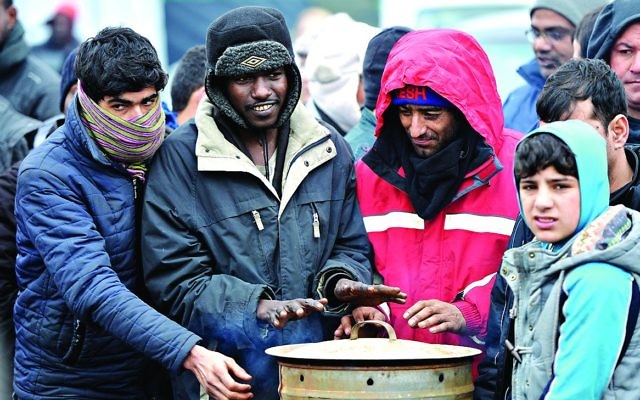Charity boss compares Calais refugees to Jews under the Nazis
The founder of Care4Calais 'didn't want to trivialise' the plight of Jews under the Nazis but drew parallels to modern refugees
Parallels can be drawn between the way refugees have been managed like “cattle” in the Calais Jungle camp and the treatment of Jews in Nazi Germany, a charity head has said.
French authorities are due to start demolishing the settlement on Monday, with buses expected to start transporting the majority of the camp’s estimated 6,500 residents to temporary accommodation centres over the rest of France.
Clare Moseley, founder of the Care4Calais refugee crisis charity which has been delivering aid to people in the camp, told the Press Association: “I would not want to trivialise what happened to the Jews because it was so awful, but there are parallels that can be drawn.
“The way that the French people treat the refugees sometimes can feel very much like cattle, it can feel very dehumanising.”
Speaking of the shipping containers housing some of the camp’s residents she said: “When they allocate them they just allocate the spaces with no thought for who the people are as individuals, so they mix communities, they mix ages … Nobody ever gets an unbroken night’s sleep, nobody ever feels safe.
“It’s very much a production line of sleep here, get food there – but no thought for the social side, so there is a feeling that they treat them like cattle rather than like people.”
From Monday, Government-organised buses are expected to take thousands of the camp’s residents to temporary reception centres where they will have to claim asylum in France within a set period of time or face deportation.
Those who refuse to leave Calais risk being arrested and deported, charities are warning.
Ms Moseley said she was “very concerned” about the well-being of the inhabitants when they reach the new centres which she said range from apartments for families to buildings such as converted barns or disused schools.
She said: “For the last year the only people who have been providing the refugees with their clothing, with their food, with medical facilities, with legal advice, has been volunteers in the camp.
“The idea that after a year of not providing all these things in one location, the French authorities are suddenly going to start providing them in over 100 locations seems questionable, so we are really worried about where they are going to get all these things from.”
Ms Moseley said she was hopeful that the demolition would take place without violent altercations, despite spats involving tear gas, smoke grenades and small rocks being thrown on Saturday evening.
Over the weekend charities have been trying to psychologically prepare people for the move, and hundreds of migrants and refugees queued for hours in the camp’s muddy, water-logged main thoroughfare for rucksacks to transport their belongings.
Ms Moseley said: “The aim is that, rather than it on Monday morning being a shock for them, or them reacting with maybe anger or disbelief, they are ready to move and the reaction is as calm as it possibly can be.
She added: “We want them to be ready to move and resigned to moving”.
Lord Dubs was himself a refugee from Nazi Germany, coming to England on the Kindertransport in 1938.

Thank you for helping to make Jewish News the leading source of news and opinion for the UK Jewish community. Today we're asking for your invaluable help to continue putting our community first in everything we do.
For as little as £5 a month you can help sustain the vital work we do in celebrating and standing up for Jewish life in Britain.
Jewish News holds our community together and keeps us connected. Like a synagogue, it’s where people turn to feel part of something bigger. It also proudly shows the rest of Britain the vibrancy and rich culture of modern Jewish life.
You can make a quick and easy one-off or monthly contribution of £5, £10, £20 or any other sum you’re comfortable with.
100% of your donation will help us continue celebrating our community, in all its dynamic diversity...
Engaging
Being a community platform means so much more than producing a newspaper and website. One of our proudest roles is media partnering with our invaluable charities to amplify the outstanding work they do to help us all.
Celebrating
There’s no shortage of oys in the world but Jewish News takes every opportunity to celebrate the joys too, through projects like Night of Heroes, 40 Under 40 and other compelling countdowns that make the community kvell with pride.
Pioneering
In the first collaboration between media outlets from different faiths, Jewish News worked with British Muslim TV and Church Times to produce a list of young activists leading the way on interfaith understanding.
Campaigning
Royal Mail issued a stamp honouring Holocaust hero Sir Nicholas Winton after a Jewish News campaign attracted more than 100,000 backers. Jewish Newsalso produces special editions of the paper highlighting pressing issues including mental health and Holocaust remembrance.
Easy access
In an age when news is readily accessible, Jewish News provides high-quality content free online and offline, removing any financial barriers to connecting people.
Voice of our community to wider society
The Jewish News team regularly appears on TV, radio and on the pages of the national press to comment on stories about the Jewish community. Easy access to the paper on the streets of London also means Jewish News provides an invaluable window into the community for the country at large.
We hope you agree all this is worth preserving.






















